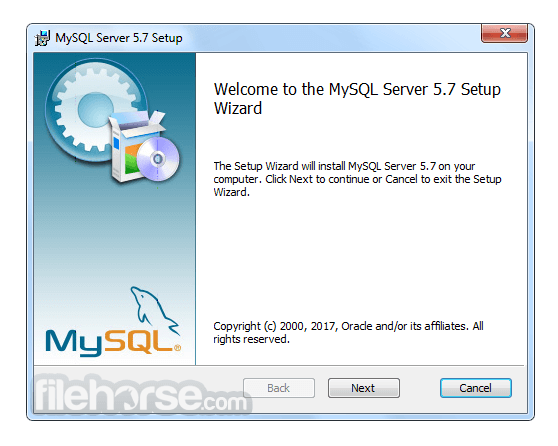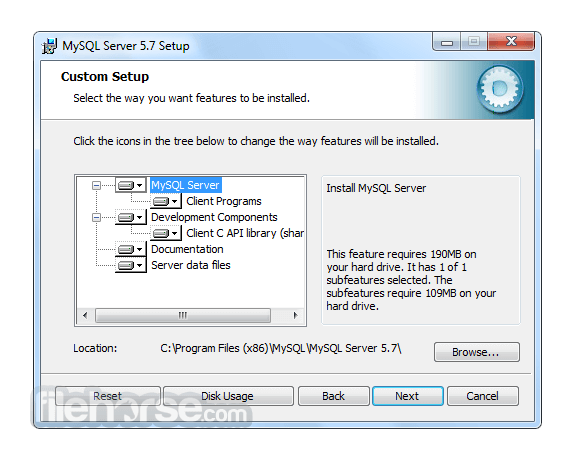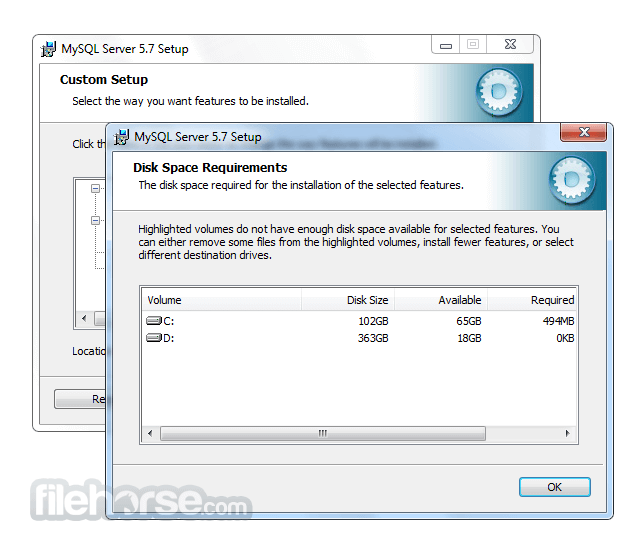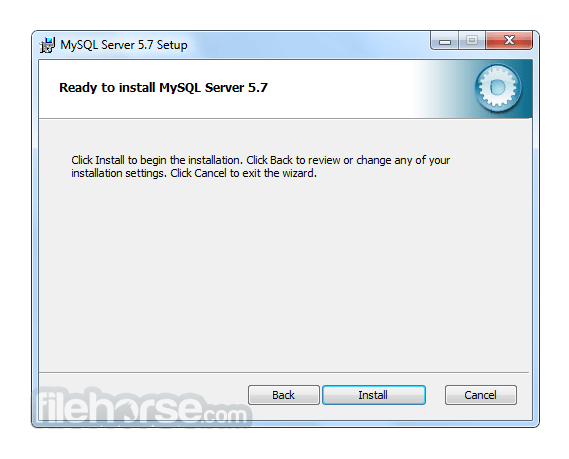-
Latest Version
-
Operating System
Windows XP64 / Vista64 / Windows 7 64 / Windows 8 64
-
User Rating
Click to vote -
Author / Product
-
Filename
mysql-5.5.40-winx64.msi
-
MD5 Checksum
47ac3cd60e865b5b54d7f17597c9ed0f
Sometimes latest versions of the software can cause issues when installed on older devices or devices running an older version of the operating system.
Software makers usually fix these issues but it can take them some time. What you can do in the meantime is to download and install an older version of MySQL 5.5.40 (64-bit).
For those interested in downloading the most recent release of MySQL or reading our review, simply click here.
All old versions distributed on our website are completely virus-free and available for download at no cost.
We would love to hear from you
If you have any questions or ideas that you want to share with us - head over to our Contact page and let us know. We value your feedback!
What's new in this version:
Bugs Fixed:
- InnoDB: An ALTER TABLE ... ADD FOREIGN KEY operation could cause a serious error.
- InnoDB: With a transaction isolation level less than or equal to READ COMMITTED, gap locks were not taken when scanning a unique secondary index to check for duplicates. As a result, duplicate check logic failed allowing duplicate key values in the unique secondary index.
- InnoDB: During recovery, a segmentation fault would occur when marking a table as corrupt.
- yaSSL client code did not validate the encryption size or session ID length, which could cause the client to exit.
- MySQL installation from RPM packages could fail if Postfix had been installed using yum.
- yaSSL could fail preauthorization if the client supplied inaccurate buffer lengths.
- Competition between threads could lead to timeout failure trying to rotate the audit log file.
- On Linux (OEL6), if Sun DTrace was installed, the MySQL build failed.
- LPAD() and RPAD() could cause a server exit if the pad string argument was not well formed.
- The optimizer could create a zero-length column for a temporary table, causing a server exit.
- MOD for very small decimal right-hand arguments could cause a server exit.
- The client library now includes a call to X509_verify_cert_error_string() in the SSL certificate verification code, to be more robust in detecting invalid certificates.
- The thread_concurrency system variable is deprecated, but no warning resulted from setting it at server startup.
- Sending a SIGQUIT or SIGINT signal to mysql could result in a glibc double free or corruption error.
- LIKE matches failed for code points of HALF WIDTH KATAKANA in the sjis and cp932 character sets.
- On EL7, installation of MySQL from RPM packages could fail if postfix had previously been installed using yum.
- mysql_upgrade could fail if the mysql.user table contained multiple accounts with the same user name and host name where the host name differed in lettercase. This is still not permitted, but now mysql_upgrade prints a more informative error message to indicate the nature of the problem:
> ERROR 1644 (45000): Multiple accounts exist for user_name, host_name
> that differ only in Host lettercase; remove all except one of them
- If the general query log or slow query log file was set to a FIFO or socket file, and the file reader went away, the server stopped executing statements. Now the server detects such files, logs an error message, and continues with the appropriate log disabled.
 OperaOpera 125.0 Build 5729.21 (64-bit)
OperaOpera 125.0 Build 5729.21 (64-bit) MalwarebytesMalwarebytes Premium 5.4.5
MalwarebytesMalwarebytes Premium 5.4.5 PhotoshopAdobe Photoshop CC 2026 27.1 (64-bit)
PhotoshopAdobe Photoshop CC 2026 27.1 (64-bit) BlueStacksBlueStacks 10.42.153.1001
BlueStacksBlueStacks 10.42.153.1001 OKXOKX - Buy Bitcoin or Ethereum
OKXOKX - Buy Bitcoin or Ethereum Premiere ProAdobe Premiere Pro CC 2025 25.6.3
Premiere ProAdobe Premiere Pro CC 2025 25.6.3 PC RepairPC Repair Tool 2025
PC RepairPC Repair Tool 2025 Hero WarsHero Wars - Online Action Game
Hero WarsHero Wars - Online Action Game TradingViewTradingView - Trusted by 60 Million Traders
TradingViewTradingView - Trusted by 60 Million Traders Edraw AIEdraw AI - AI-Powered Visual Collaboration
Edraw AIEdraw AI - AI-Powered Visual Collaboration










Comments and User Reviews